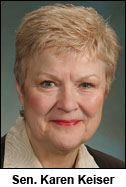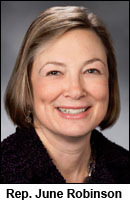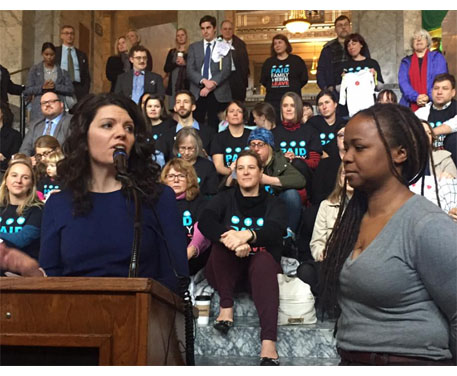STATE GOVERNMENT
Renewed push begins in Olympia for paid family leave
The following is from the Washington Work and Family Coalition, which includes the Washington State Labor Council, AFL-CIO:
OLYMPIA (Jan. 11, 2017) — The Washington Work and Family Coalition on Tuesday announced its policy proposal for paid family and medical leave in Washington. Under the proposed bills, Washington workers would be able to use extended paid leave for events like the birth of a child, a personal health emergency, or to take care of an ill family member, like an aging parent.
A recent poll showed at least 72 percent of Washington voters supported passing paid family and medical leave, and the Work and Family Coalition is looking to the Legislature to act.
 “All of us have experienced a family or health crisis for which a couple sick days just weren’t enough, whether it was a premature baby, an unexpected illness, or the failing health of a parent,” said Sen. Karen Keiser (D-Des Moines), the sponsor of the Senate bill (SB 5032). “Paid family and medical leave would mean better health outcomes for Washington babies, moms, and families in every stage of life.”
“All of us have experienced a family or health crisis for which a couple sick days just weren’t enough, whether it was a premature baby, an unexpected illness, or the failing health of a parent,” said Sen. Karen Keiser (D-Des Moines), the sponsor of the Senate bill (SB 5032). “Paid family and medical leave would mean better health outcomes for Washington babies, moms, and families in every stage of life.”
 “No family should struggle to take time off in the face of a serious illness or to care for a new baby,” said Rep. June Robinson (D-Everett), the sponsor of the House bill (HB 1116). “It’s time to move forward with paid family and medical leave. Our plan was created with the advice of health experts, worker groups, community organizations, and Washington business owners. This is a solution that works for everyone.”
“No family should struggle to take time off in the face of a serious illness or to care for a new baby,” said Rep. June Robinson (D-Everett), the sponsor of the House bill (HB 1116). “It’s time to move forward with paid family and medical leave. Our plan was created with the advice of health experts, worker groups, community organizations, and Washington business owners. This is a solution that works for everyone.”
Beginning in 2019, employees could take up to 26 weeks of paid family leave, which includes caring for a newborn or newly-adopted child or an ill family member, including injured service members. Beginning in 2020, an employee could take up to 12 weeks of paid medical leave, which can be used for the employee’s own serious health condition.
The program would be funded by payroll premiums paid by both employees and employers, costing each about $2 a week for a typical Washington worker — which makes it incredibly affordable for business owners.
 “This is an affordable, predictable solution to a problem too many workers — and business owners — face,” said Molly Moon Neitzel, owner of Molly Moon’s Homemade Ice Cream (pictured, at left). “We’ve done the math, and under this plan the annual cost to cover our entire company for a year would be less than I’m paying for maternity leave for one employee alone this year. This makes providing extended leave more possible for more small businesses.”
“This is an affordable, predictable solution to a problem too many workers — and business owners — face,” said Molly Moon Neitzel, owner of Molly Moon’s Homemade Ice Cream (pictured, at left). “We’ve done the math, and under this plan the annual cost to cover our entire company for a year would be less than I’m paying for maternity leave for one employee alone this year. This makes providing extended leave more possible for more small businesses.”
Only 13 percent of workers have access to paid family and medical leave, usually high-wage earners, according to the Bureau of Labor Statistics. Among lower-wage workers — predominantly women and people of color — the rate is 4 percent. Despite the high costs of infant childcare and pediatricians’ recommendations to breastfeed for at least six months, one in four women go back to work within two weeks of childbirth because they can’t afford to stay home longer. Women in states with paid leave programs take longer leaves and are more likely to be working a year following childbirth and earn more than women in other states.
“Paid family and medical leave helps women and low-income workers keep their job through an emergency, which helps ensure our workforce actually represents our population,” said Makini Howell, owner of Plum Bistro in Seattle (pictured above, at right). “I’ve been a service employee, and I know what it’s like to work long hours for low pay and poor benefits. I treat my workers differently, and this policy makes it affordable for me to provide extended paid leave.”
Workers and parents from coalition organizations shared their experiences about not having paid leave for family or health emergencies.
“When I was diagnosed with breast cancer, I had the incredible support of my family, the legal protection of unpaid federal medical leave, and even a financial cushion,” said Terri Calvillo of Tacoma, a member of UFCW 367. “But it wasn’t enough to last through treatment and surgeries. I can tell you that the last thing you need when facing cancer is worrying about losing your job and health insurance. It was the worst experience of my life, and the financial security of paid medical leave would have helped.”
“Like many daughters, I have helped care for both of my parents in the final months of their lives,” said Adriana Hutchings, a MomsRising member in Olympia. “When my mother was dying, I had no access to paid leave. With the cost of daycare for my three children, I literally could not work without the option to take paid leave because financially it didn’t make sense. My family was able to make it on my husband’s salary alone, but it was a challenge. It also meant we weren’t able to save as much for our children’s college funds or our own retirement.”





